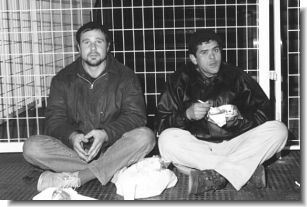|
Indefinite Life Sentences
 Many people have had an experience of imprisonment. Moreover, the imprisonment has been the preamble for a life on the street. In fact, at the moment of release, being without any kind of help (family or any other means), they were left without any point of reference. Many people have had an experience of imprisonment. Moreover, the imprisonment has been the preamble for a life on the street. In fact, at the moment of release, being without any kind of help (family or any other means), they were left without any point of reference.
The offences the homeless generally are accused of are included in the so-called micro criminality: on the one hand the scarce seriousness of the offences, on the other hand the foreseen benefits for sentences shorter than two/three years (entrusting the offendere to Social Services, semi-custody, ..etc.) could lead people to think at good possibilities of rehabilitation for this type of convicts. On the contrary, the deviant behaviours of the homeless have a tendency to repeat the crime because of the absence of substantial alternatives.
People who sin once pay double
In these cases the experience of imprisonment inserted in personal and environmental situations often poor whether economically or culturally: this disadvantage position together with the lack of resources in social safety system makes it possible, that people who sin once pay a double punishment: the imprisonment and then he following repeated exclusion from a social and working context.
People who have criminal record have few hopes of finding a regular job. The absence of a fixed place of residence makes this situation harder: looking for a job is almost impossible, unless in the meantime they find a home. But this is likewise unreachable for a person alone with no fixed income.
Life like a prison
Sometimes the physical conditions of people living on the street are so deteriorated that, after a period in prison they feel better, simply because they have eaten regularly. It seems a paradox, but for someone the prison becomes the only "home" they had and the convict job the only proper job: this is a singular yet real aspect in the life of the homeless. They desire to work, but the opportunities for a homeless convict are very scarce.
Likewise it is difficult for them to take advantage of alternative measures instead of imprisonment. The first difficulty is economical: they cannot pay a lawyer so they must have a citizen advice lawyer. Moreover they not always have the necessary information in order to be able to ask for the benefits they are entitled to: it is necessary an outside connection, a knowledge of the resources of social system that the homeless often do not have.
A decisive role is again determined by the possibility to have a fixed home, indispensable in order to obtain alternative solutions like house arrest or work on guarded leave, etc..
|
![]()
